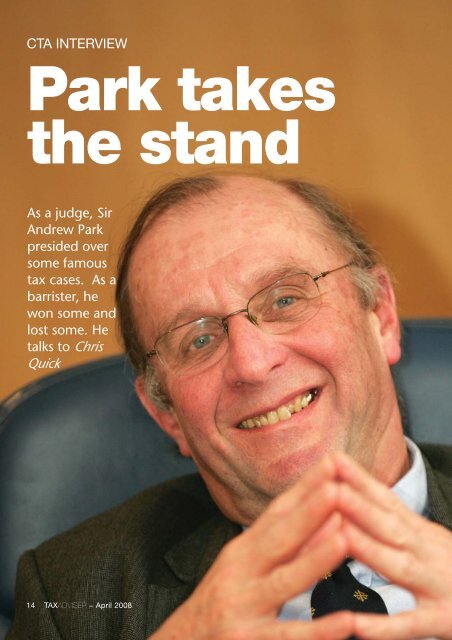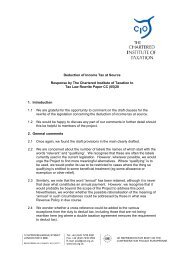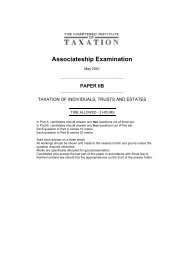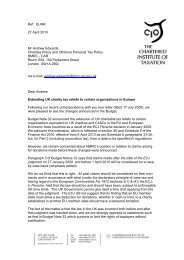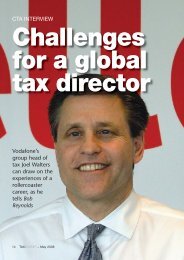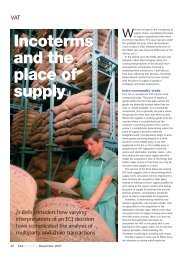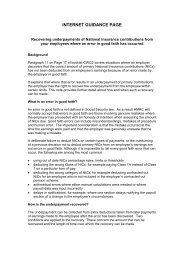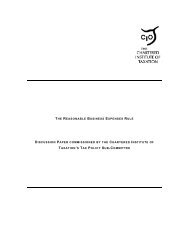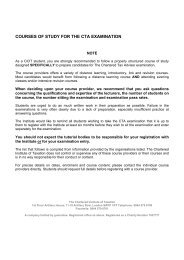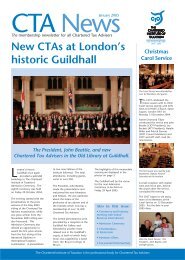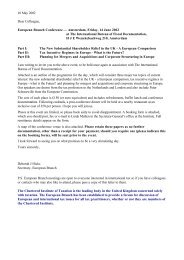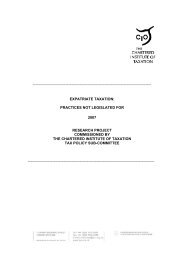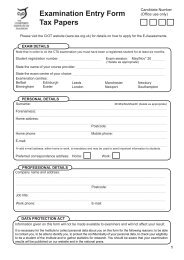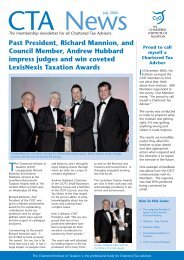CTA INTERVIEW As a judge, Sir Andrew Park presided over ... - CIOT
CTA INTERVIEW As a judge, Sir Andrew Park presided over ... - CIOT
CTA INTERVIEW As a judge, Sir Andrew Park presided over ... - CIOT
- No tags were found...
Create successful ePaper yourself
Turn your PDF publications into a flip-book with our unique Google optimized e-Paper software.
<strong>CTA</strong> <strong>INTERVIEW</strong><strong>Park</strong> takesthe stand<strong>As</strong> a <strong>judge</strong>, <strong>Sir</strong><strong>Andrew</strong> <strong>Park</strong><strong>presided</strong> <strong>over</strong>some famoustax cases. <strong>As</strong> abarrister, hewon some andlost some. Hetalks to ChrisQuick14 TAXADVISER – April 2008
<strong>CTA</strong> <strong>INTERVIEW</strong><strong>Sir</strong> <strong>Andrew</strong> <strong>Park</strong> – awarded an honoraryfellowship of the <strong>CIOT</strong> in January – hasbeen involved in some of the UK’s bestknowntax cases. During a nine-year stintas a High Court <strong>judge</strong> ending last year,notable cases included Arctic Systems,eventually concluded last year after twistingand turning its way up to the House of Lords.‘It shows what a lottery litigation can be,’ hesays of the conflicting judgments that weregiven as the case worked its way up throughthe court system.He also sat in a large number of casesinvolving the impact of European Communitylaw on the UK corporation tax system. Mostlyorganised as group litigation orders, the cases,for example involving Pirelli on ACT and Marks& Spencer on loss relief, are well known to taxexperts. Issues raised in them have led tosignificant changes to the British tax regime.But his involvement in well-known tax casesgoes back much further than 1997, when hefirst donned his <strong>judge</strong>’s robes in the ChanceryDivision of the High Court of Justice. Beforethis he was a hotshot tax barrister involved inmany high-profile – and many lesser-known –cases. He estimates that he appeared in well<strong>over</strong> 100 tax cases of all sorts and at all levels,from the General Commissioners to the Houseof Lords or the European Court. Many ofthese involved several hearings. And he had alarge advisory practice going on at the sametime.He represented fellow barrister AnnMallalieu in her famous claim to deduct costsrelated to clothing purchased to conform tocourt dresscodes as a deductible expenseagainst taxable income. They lost at thegeneral commissioners, won in both the HighCourt and then the Court of Appeal, but in1983 lost in the House of Lords. <strong>Park</strong> describesthis loss in Mallalieu v Drummond as ‘mysaddest moment at the bar’.More successful, however, was the 1990scase McGuckian v Commissioners of the InlandRevenue, which <strong>Park</strong>, appearing for theRevenue, won at the House of Lords: he sayshe has strong and good memories of this one.He became a QC in 1978 and was chairmanof the Revenue Bar <strong>As</strong>sociation for five years,starting in the late 1980s.It was while he was a barrister that he firststarted to work with the Institute of Taxation,as it was called in its pre-charter days, whichled to his long involvement in <strong>CIOT</strong> affairs,marked by his honorary fellowship award atthis year’s president’s lunch.The work involved the development ofethical standards in tax practice, whichincluded legal questions on issues such asclient privilege. He developed an admirationfor the institute, and it for him, and once thework was completed he was awarded with afellowship and subsequently an invitation tojoin its council, which he did for four years.His greatest contribution as councilmember, he says, was persuading the thenlord chancellor, Lord Mckay of Clashfern, topresent the institute with its newly-acquiredcharter in 1994 at a grand occasion at theGreat Hall in Lincoln’s Inn.‘It’s a veryprivilegedoccupation andquite worrying,because mostcases that come toyou are going toaffect somebody’slife in quite asignificant way’On being a <strong>judge</strong>So what’s it like being a <strong>judge</strong>? ‘It’s a veryprivileged occupation and quite worrying,because most cases that come to you aregoing to affect somebody’s life in quite asignificant way,’ says <strong>Park</strong>.He says that the basic objective for any<strong>judge</strong> is of course to get to the right answer.‘But there is more than that. One thing Ialways try hard to do is to keep a pleasantatmosphere in the court and make it asapparent as possible that everyone is getting afair crack of the whip.’Judges, he observes, differ in theirtemperaments. ‘Some are quite aloof.Some are frankly difficult to appear beforeand can make cases very unpleasant. I didn’twant to do that. I suspect that I was easygoingto a fault on occasions when I shouldhave put my foot down a bit more andspotted a case rambling somewhat. I tendedto do that because I didn’t want to hurtpeoples’ feelings.’His range of cases was not restricted just totax. Although he retired last year, he still sitsoccasionally, and indeed spent either side ofChristmas presiding <strong>over</strong> a case involvingparallel imports and trademarks. He did moretax cases, he says, in the latter part of his timeat the High Court. Other fields he tackledincluded adverse possession, insolvency andcopyright.Judges, he says, are generally well capableof getting on top of technical cases in fields inwhich they are unfamiliar, since the issues aredistilled down by the time the cases reachcourt, and because specialist barristers helpthem – and will tailor the way they presenttheir arguments according to the <strong>judge</strong>’srange of expertise.It was on non-tax cases that <strong>Park</strong>experienced some of his more colourfulcourtroom episodes. He says that the cases inwhich you find yourself not knowing what isgoing to happen next tend to be when youhave litigants in court who can explode at anyminute. One of his most difficult involved a‘fractured and fractious’ Iraqi family, of whichthree members were bringing an actionagainst a fourth.‘It was awful,’ he says. ‘There was hugehostility and animosity. One side wasrepresented by solicitor and counsel, and theother was not. It was a very unpleasant case.’Another case involved a witness collapsingin the dock while being cross examined duringa contentious case. The man was rushed off tohospital, and survived. ‘I thought at one stagehe might be going to die. It only happened tome once.’An occasional cause of embarrassment to<strong>Park</strong> was turning up dressed in wig and robeswhen he shouldn’t have been, and vice-versa.TAXADVISER – April 2008 15


